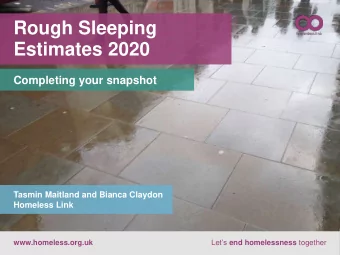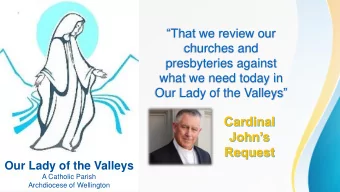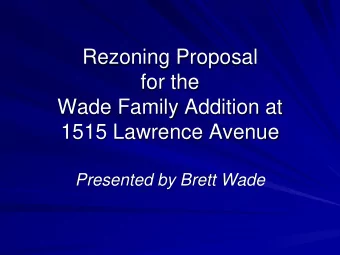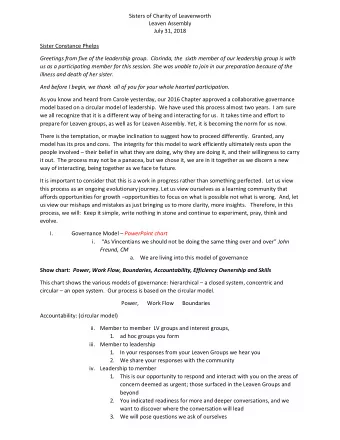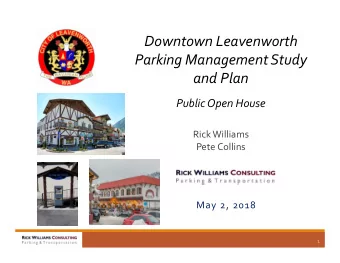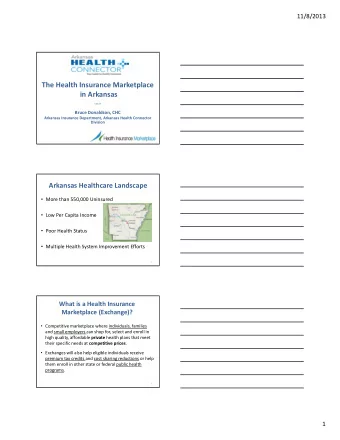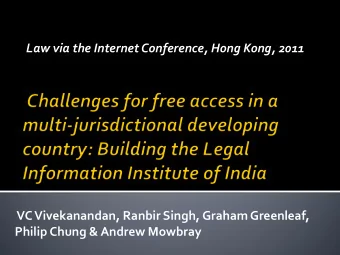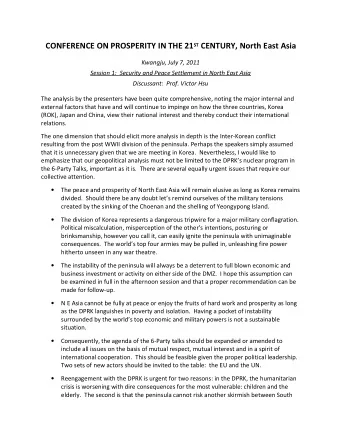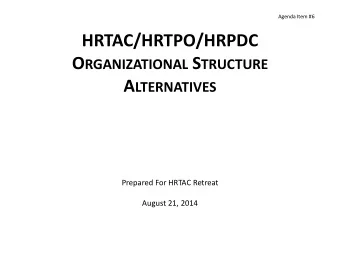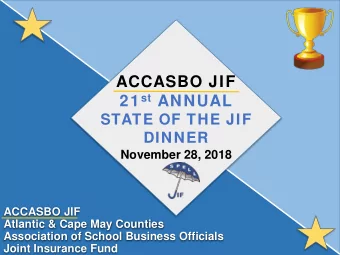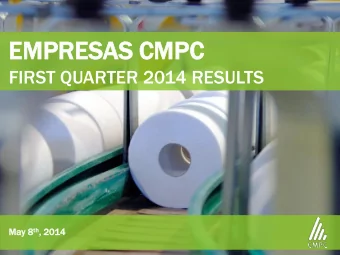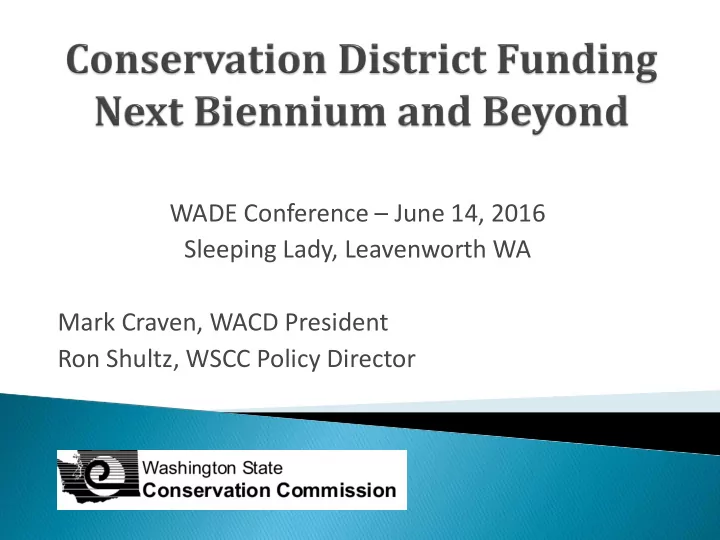
WADE Conference June 14, 2016 Sleeping Lady, Leavenworth WA Mark - PowerPoint PPT Presentation
WADE Conference June 14, 2016 Sleeping Lady, Leavenworth WA Mark Craven, WACD President Ron Shultz, WSCC Policy Director Roles of the conservation districts and Conservation Commission relationship to funding. How conservation
WADE Conference – June 14, 2016 Sleeping Lady, Leavenworth WA Mark Craven, WACD President Ron Shultz, WSCC Policy Director
Roles of the conservation districts and Conservation Commission – relationship to funding. How conservation districts and the Conservation Commission are funded. Historic funding amounts. Funding status for the next several years. April 20-21 meeting of WSCC / WACD / CDs Plans for next steps for conservation district and Conservation Commission funding.
Statutory duties and functions: CDs constitute a governmental subdivision of the state, and a public body corporate and politic exercising public powers, but shall not levy taxes or issue bonds. Shall have the following powers: (1) To conduct surveys, investigations, and research relating to the conservation of renewable natural resources and the preventive and control measures and works of improvement needed…; (2) To carry out preventative and control measures and works of improvement for the conservation of renewable natural resources, within the district…; (3) To make available, on such terms, as it shall prescribe, to land occupiers within the district, agricultural and engineering machinery and equipment, fertilizer, seeds, seedlings, and such other equipment and material as will assist them to carry on operations upon their lands for the conservation of renewable natural resources; (4) To administer any project or program concerned with the conservation of renewable natural resources located within its boundaries undertaken by any federal, state, or other public agency by entering into a contract or other appropriate administrative arrangement with any agency administering such project or program;
Independent state agency established in 1939. Oversee the activities of the conservation districts. Serve as a coordinating agency for incentive-based activities relating to impacts to natural resources from ag activities. To compile and submit to the governor and legislators a budget of the needs of the districts and Commission.
Local Funding: ◦ Assessments / Rates and Charges ◦ County funding (i.e. stormwater funds) ◦ Grants – state (i.e. DOE 319); federal (i.e. TSP, EPA or NRCS specific program grants) State Funding: ◦ State General Fund – operating ◦ State Capital Fund Federal Funding ◦ USDA / EPA / NWPCC Grants / NGOs
SCC duty to: “…recommend the inclusion in annual and longer term budgets and appropriation legislation of the state of Washington of funds necessary for appropriation by the legislature to finance the activities of the commission and the conservation districts” SCC builds a budget that includes requested funding for both the agency activities and CD work. Based on the activities and needs of both entities.
Budget a Whole With Parts WSCC Budget = District Budgets + Agency Needs + New Adds Funding Sources State Federal Other General Fund EPA EQIP Water Quality Account USDA CREP Columbia River Account NGO Grants TSP Flood Account Other?
Budget Evaluation 2015-17 SCC Budget REQUEST / Operating & Capital 2015-17 SCC Budget ACTUAL / Operating & Capital 2015-17 SCC Budget NEEDS / Operating & Capital How do we address these needs?
State Fund Sources ◦ General Fund Primary source of funding for state government operations. Approximately $42 billion next biennium Funds all education, social services, prisons and criminal justice, universities and colleges, and natural resources. Historically, natural resources account for about 1% of the state budget.
Joint Work Session of the Senate Agriculture and House Agriculture and Natural Resources Committees November 29, 2012
Joint Work Session of the Senate Agriculture and House Agriculture and Natural Resources Committees November 29, 2012
Joint Work Session of the Senate Agriculture and House Agriculture and Natural Resources Committees November 29, 2012
Joint Work Session of the Senate Agriculture and House Agriculture and Natural Resources Committees November 29, 2012
State Fund Sources ◦ Capital Budget • Funds projects and “on-the-ground” work. • May fund some technical assistance. • Biennial funding may be re-appropriated in future biennia. • Cannot be used to hire staff (generally).
Operating 2007-09 $17,791,000 ($10,617,000 WQ) ($500k OFP / $500k Pioneers / $150k PSP / $174k cons markets / $250k poultry) Actual: $15,039,000 2009-11 $16,019,000 Actual: $14,841,000 2011-13 $14,510,000 Actual: $13,209,000 2013-15 $16,878,000 ($1m fed and $300k VSP/ $1,050,000 toxics) Actual: $12,527,000 2015-17 $32,327,000 ($1m fed and $7.6m VSP / $1m toxics / $7.8m fire) Actual: $12,626,000
Recent budget instructions from OFM: Agencies must find ways to manage budgets without increased funding Extraordinary funding needs of education in the next biennium. State agencies and their local partners should expect to manage within current projected state resources. Competition for available resources will be intense. While agencies should always strive to reduce costs and find new ways to save resources, these efforts will be especially important over at least the next two biennia. Requests for new funding should be limited and focused on the highest priority services that deliver significant performance improvements and outcomes for the people of Washington.
Recent budget instructions from OFM: In reviewing agency budget requests, OFM will ask these questions: • What strategies and activities will be most effective in achieving agency and statewide goals and priorities? • Given financial or other constraints, how can we maximize the outcomes of our highest priority services and activities? • How else can the state meet desired outcomes in a more cost-effective manner?
Recent budget instructions from OFM: State agency strategic plans, activity descriptions and decision package information should all focus on answering these questions. The best budget proposals are persuasive not only at the agency level, but also in the broader statewide context that the Governor, OFM and the Legislature must consider when making decisions across state government. Proposals that make the strongest case will be those that discuss the value and benefits of the services they deliver to achieve positive statewide outcomes.
Strategic framework — focus on results and strategic plans Agency budget requests should reflect Governor Inslee’s statewide strategic goals articulated through Results Washington and agency- specific strategic plans. Results Washington – Decision packages must identify the Results Washington statewide goals and outcome measures they are designed to address. Packages should clearly articulate how budget requests will achieve implementation of strategies and plans developed by the Results Washington goal councils. Agency Strategic Plans – For 2017-19 biennial budget requests, OFM is again requiring agencies to submit strategic plans. Budget decision packages should align closely with agency strategic plans, goals and performance measures.
Strategic framework — focus on results and strategic plans OFM will work with the Governor using Results Washington goals, outcome measures and action plans — along with agency strategic plans, strategies and performance measures—to prioritize budget purchases within and across agency budgets as we develop the Governor’s 2017-19 budget recommendations. Improving the efficiency and streamlining the operations of state government is an expectation Governor Inslee has of all agencies. “Fostering a Lean culture that drives accountability and results for the people of Washington” remains a central tenet of the Results Washington management effort.
Compelling budget requests – dos and don’ts Agencies are encouraged to limit budget requests and to ensure that those requests are comprehensive and capable of withstanding a highly competitive fiscal environment. Do: • Look for ways to save resources. • Develop options to meet your highest priorities in the most cost-effective manner. o How else can we accomplish this? o What can we reprogram to meet our needs? o How can we reduce the cost? • Focus intensely on performance and outcomes. o What will the decision package accomplish? o Who will be served? At what level? o How will we know? o What are our performance targets? o How likely are the targets to be met? • Spend your time on the most critical things. • Look forward to the future, not back to the past.
Agencies should severely limit requests for new or expanded programs or for new policy initiatives. Don’t: • Request restoration of prior cuts; in most cases, agencies are not entitled to a prior level of funding. • Request a prior “share” of the budget (there is no such thing). • Request past unfunded inflationary or other cost increases. (These are not compelling arguments for limited resources. If resources are needed, make your strongest case based on articulated need, performance, outcomes and results.) • Request a new program or initiative without a comprehensive and realistic plan to fund its full implementation in the future. • Try to bury policy-level requests in maintenance level; when in doubt, ask.
Recommend
More recommend
Explore More Topics
Stay informed with curated content and fresh updates.





